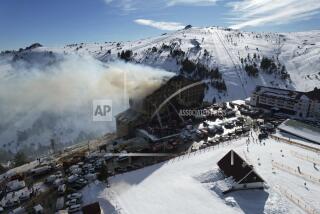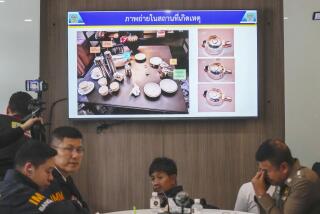Blast could derail alliance
- Share via
BAGHDAD — Five sheiks and a political official supporting the arming of Sunni Arab tribes to fight against Al Qaeda in Iraq were among 12 people killed Monday in a massive bomb blast at a heavily guarded Baghdad hotel.
The early afternoon attack risked derailing an emerging alliance between Sunni Muslim tribal leaders in long-restive Al Anbar province and the country’s Shiite Muslim majority the day after a key round of negotiations to formalize their relationship with Iraqi Prime Minister Nouri Maliki’s government.
No group immediately claimed responsibility for the bloody bombing. U.S. and Iraqi government officials said they thought it was the work of Al Qaeda-linked militants. But in a display of the rancor that the bombing could engender, two prominent Sunni tribesmen made new threats against Iraq’s Shiites, blaming the blast on Maliki’s government or agents of Shiite-dominated Iran.
The explosion at the fortified Mansour Melia Hotel, home to the Chinese Embassy, parliament members and prominent national figures, came on a day that saw at least 48 deaths across Iraq in suicide attacks, bombings and mortar strikes.
Survivors described being knocked down by the force of the blast, which various witnesses ascribed to either a suicide bomber or explosives placed in the hotel’s lobby. Those wading through the smoke said they saw the charred bodies of several Sunni and Shiite tribal leaders whom they had hoped would help Iraq overcome its fierce sectarian warfare.
“The target was the national project that even involved Mr. Maliki,” said Sheik Mohammed Daham Fahdawi, whose Sunni tribe has been fighting foreign Islamist militants around Habbaniya in Al Anbar.
Fahdawi, who said he was unsure who was behind the bombing, said he escaped death only because he had risen from a seat by the lobby’s television and walked a short distance away when the blast occurred. It threw him down and he scrambled through the dust to find his colleagues dead.
Many of them had been in a meeting with Maliki on Sunday in which they agreed on procedures for enrolling tribesmen into local police forces.
The dead included a former governor of Al Anbar, Sheik Fassal Guood of the Albu Nimir tribe; Sheik Abdul-Aziz Fahdawi of the Fahad tribe; Sheik Tariq Saleh Dulaimi, a commander in the fight against Al Qaeda in Iraq; Mohammed Awadi, a Shiite cleric from Najaf; Hussein Shaalan, a Shiite tribal leader who had attended a government conference on reconciliation; and Shiite politician Aziz Yasseri, an advisor to the Iraqi Defense Ministry.
Poet Rahim Maliki, who was making a TV program on the Sunni tribes fighting Al Qaeda, also died in the bombing. Eighteen others were injured, police said.
Among those touring the blast site later was Shiite politician Ahmad Chalabi, now a secular advisor to the prime minister.
Amid the broken glass and blood congealed on the floor, Chalabi worried about the effect of the killings on the Sunni tribes that had reached out to the government.
“This is a message from the terrorists to all the leaders in Al Anbar, Abu Ghraib [a town near Baghdad] and Diyala [province, northeast of the capital] who want to come to terms with the situation and negotiate with the government; they are vulnerable and in easy reach even when they are in one of the most secure areas in Baghdad,” Chalabi said.
Prime Minister Maliki later pledged his support for the tribes fighting Al Qaeda.
In the talks Sunday, participants had agreed in principle to guidelines for forming local police battalions.
Last week, Maliki had warned that the national government wanted control over the process, which was initiated by the U.S. military in Al Anbar.
So far, eight tribal police battalions have been created there, and the U.S. military has tried to incorporate the idea in Diyala. American officials see it as a way to promote national reconciliation at a time when Iraq’s government remains deadlocked on major initiatives.
The bombing, however, appeared to have sown new ill will. Sheik Ali Hatem Sulaiman, an Al Anbar tribal leader, accused Iraqis working for Iran of carrying out the blast. His words amounted to a veiled reference to Shiite militias.
Meanwhile, a member of Sheik Guood’s family, Sheik Yassin, pointed the finger at the Iraqi government.
“We know who did this. It’s a specific side. It is the Maliki government,” he told the Dubai, United Arab Emirates-based Sharqiya television channel.
In other attacks Monday, a car bomb targeted two minibuses carrying police academy recruits in the southern city of Hillah, killing eight people and wounding 25, police said.
A suicide bomber exploded a fuel truck outside the Baiji police station, 125 miles north of Baghdad, killing 18 people and wounding 50 others, police said. The U.S. military said 17 of the dead were policemen.
Seventeen corpses, most bearing gunshot wounds or signs of torture, were found in Baghdad, all but one of them on the city’s western side, which remains a battleground between Shiite militias and Sunni fighters.
A U.S. soldier from the Multinational Division Center south of Baghdad died from small-arms fire as he drove in a convoy, the U.S. military said.
A second soldier was killed and three wounded in a bomb blast in Baghdad, the U.S. Army announced.
Times staff writers Wail Alhafith, Saif Hameed and Suhail Ahmad contributed to this report.
More to Read
Sign up for Essential California
The most important California stories and recommendations in your inbox every morning.
You may occasionally receive promotional content from the Los Angeles Times.













